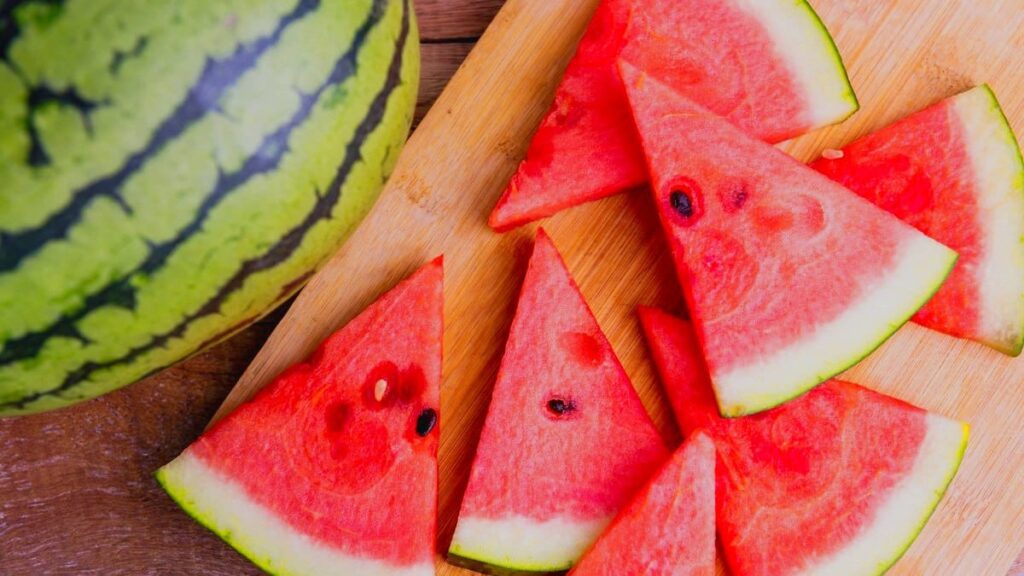
Watermelon is more than just a refreshing summertime treat; it’s a powerhouse of hydration and nutrients. With its vibrant red flesh, juicy texture, and sweet flavor, watermelon is a fruit that satisfies taste buds while offering numerous health benefits. Packed with vitamins, minerals, and antioxidants, it’s a guilt-free indulgence that complements a healthy lifestyle. Let’s dive deep into the nutritional profile of watermelon to understand why this fruit deserves a prominent place in your diet.
Watermelon Nutrition Overview
Watermelon is primarily composed of water, making it an excellent choice for hydration. It’s low in calories and contains essential nutrients that promote overall health. Here is the nutritional breakdown of 100 grams of watermelon:
- Calories: 30
- Water Content: 91.5%
- Protein: 0.6 grams
- Carbohydrates: 7.6 grams
- Sugars: 6.2 grams
- Fiber: 0.4 grams
- Fat: 0.2 grams
Key Vitamins and Minerals in Watermelon
- Vitamin C
- Boosts immunity
- Promotes healthy skin
- Vitamin A
- Supports eye health
- Encourages cell growth
- Potassium
- Regulates blood pressure
- Maintains proper muscle function
- Magnesium
- Supports bone health
- Aids in energy production
- Lycopene (an antioxidant)
- Protects against cell damage
- Reduces inflammation
Health Benefits of Watermelon
1. Supports Hydration
Watermelon’s high water content helps keep the body hydrated, especially during hot weather. Staying hydrated is essential for maintaining energy levels, regulating body temperature, and supporting overall bodily functions.
2. Promotes Heart Health
Lycopene, a powerful antioxidant found in watermelon, is associated with improved heart health. It helps reduce oxidative stress and inflammation, which are key factors in heart disease. Additionally, potassium aids in managing blood pressure levels.
3. Boosts Immune Function
The combination of vitamin C and other antioxidants strengthens the immune system, helping the body fight off infections and illnesses.
4. Aids in Digestion
Watermelon contains small amounts of dietary fiber, which supports healthy digestion. The water content further helps to keep the digestive system functioning smoothly.
5. Improves Skin Health
Vitamin A and C play a crucial role in skin health. Vitamin C promotes collagen production, which keeps the skin firm and youthful, while vitamin A helps repair skin cells.
6. May Reduce Muscle Soreness
Watermelon contains an amino acid called citrulline, which has been linked to reduced muscle soreness. Athletes often consume watermelon or its juice to enhance recovery after exercise.
Calories in Watermelon
One of the reasons watermelon is so popular is its low-calorie content. A typical serving size of 154 grams (one cup) contains about 46 calories. This makes it an ideal snack for those watching their calorie intake. Despite its sweetness, watermelon’s natural sugars are balanced by its high water content, ensuring it remains a healthy option.
Watermelon Varieties
Watermelons come in various shapes, sizes, and colors. Here are some popular types:
- Seedless Watermelon
- Convenient to eat
- Slightly sweeter than seeded varieties
- Seeded Watermelon
- Classic variety with black seeds
- Mini Watermelon
- Smaller and easier to store
- Perfect for individual consumption
- Yellow or Orange Watermelon
- Contains beta-carotene
- Sweeter and more tropical in flavor
How to Incorporate Watermelon into Your Diet
Watermelon is versatile and can be enjoyed in many ways. Here are some ideas to include it in your daily meals:
- As a Snack: Enjoy fresh slices of watermelon on a hot day.
- In Salads: Combine watermelon cubes with feta cheese, mint, and a drizzle of balsamic vinegar for a refreshing salad.
- As a Drink: Blend watermelon into a smoothie or juice.
- Frozen Treats: Make watermelon popsicles for a cooling dessert.
- Grilled: Yes, watermelon can be grilled! A quick sear brings out its natural sweetness.
Watermelon for Weight Loss
Thanks to its low calorie and high water content, watermelon is an excellent fruit for weight management. It satisfies sweet cravings without adding significant calories, making it a go-to snack for those aiming to shed pounds.
Potential Downsides of Consuming Watermelon
While watermelon is generally safe and healthy, excessive consumption can lead to minor issues such as:
- Digestive Discomfort
- The natural sugars in watermelon can cause bloating or gas in some people.
- Blood Sugar Spikes
- Individuals with diabetes should consume watermelon in moderation due to its sugar content.
- Allergic Reactions
- Rare cases of watermelon allergies have been reported, leading to symptoms like itching or swelling.
